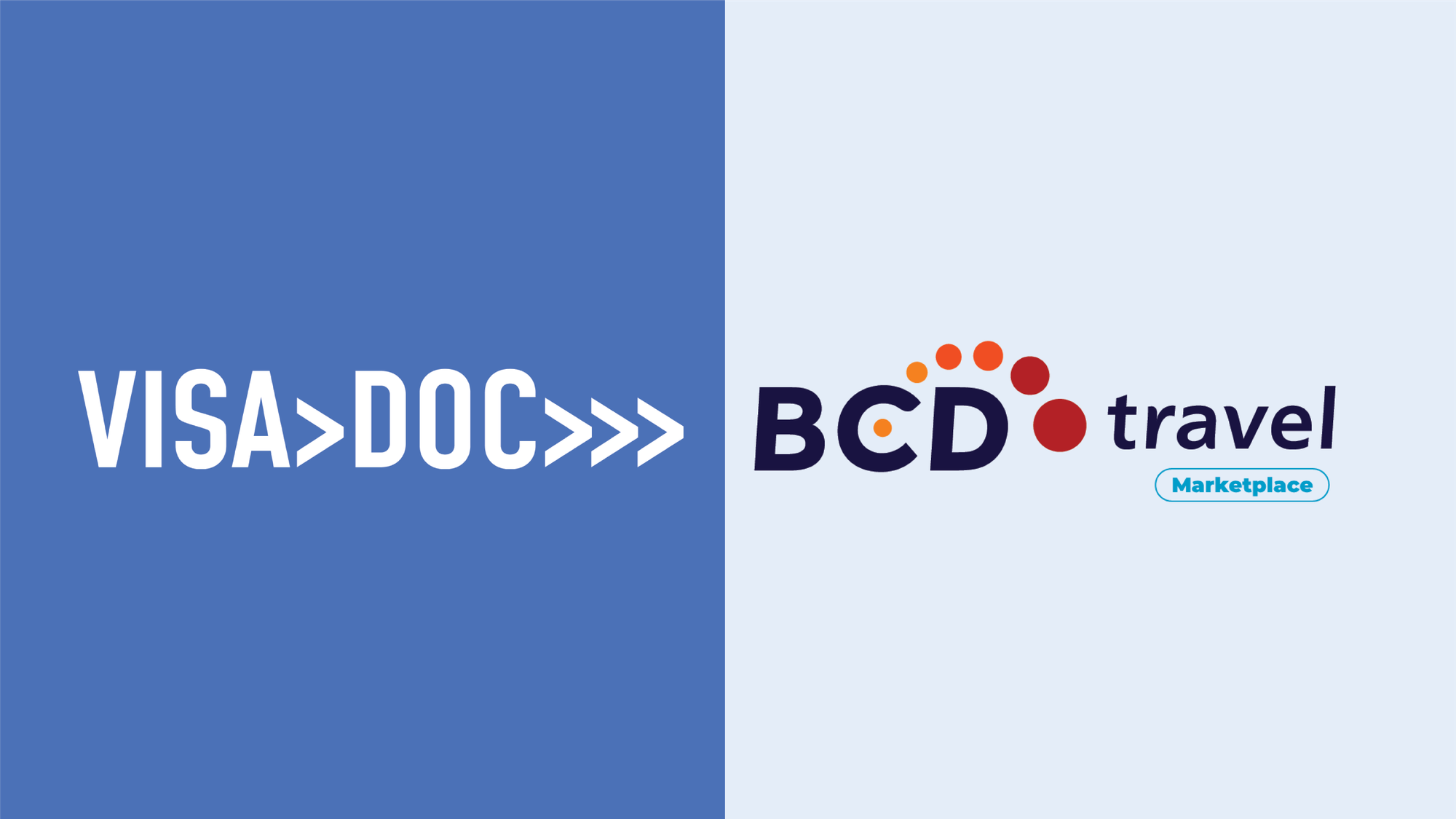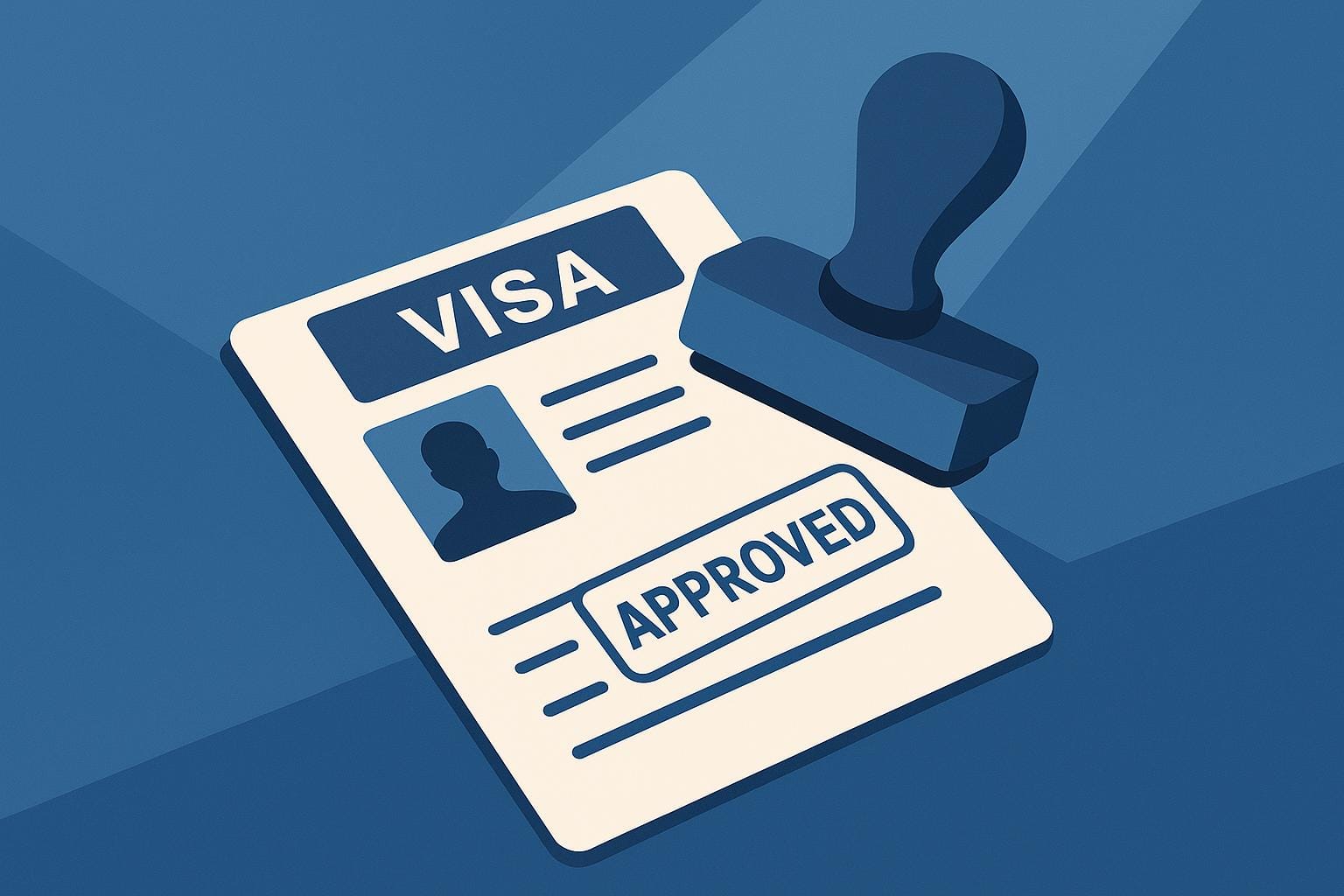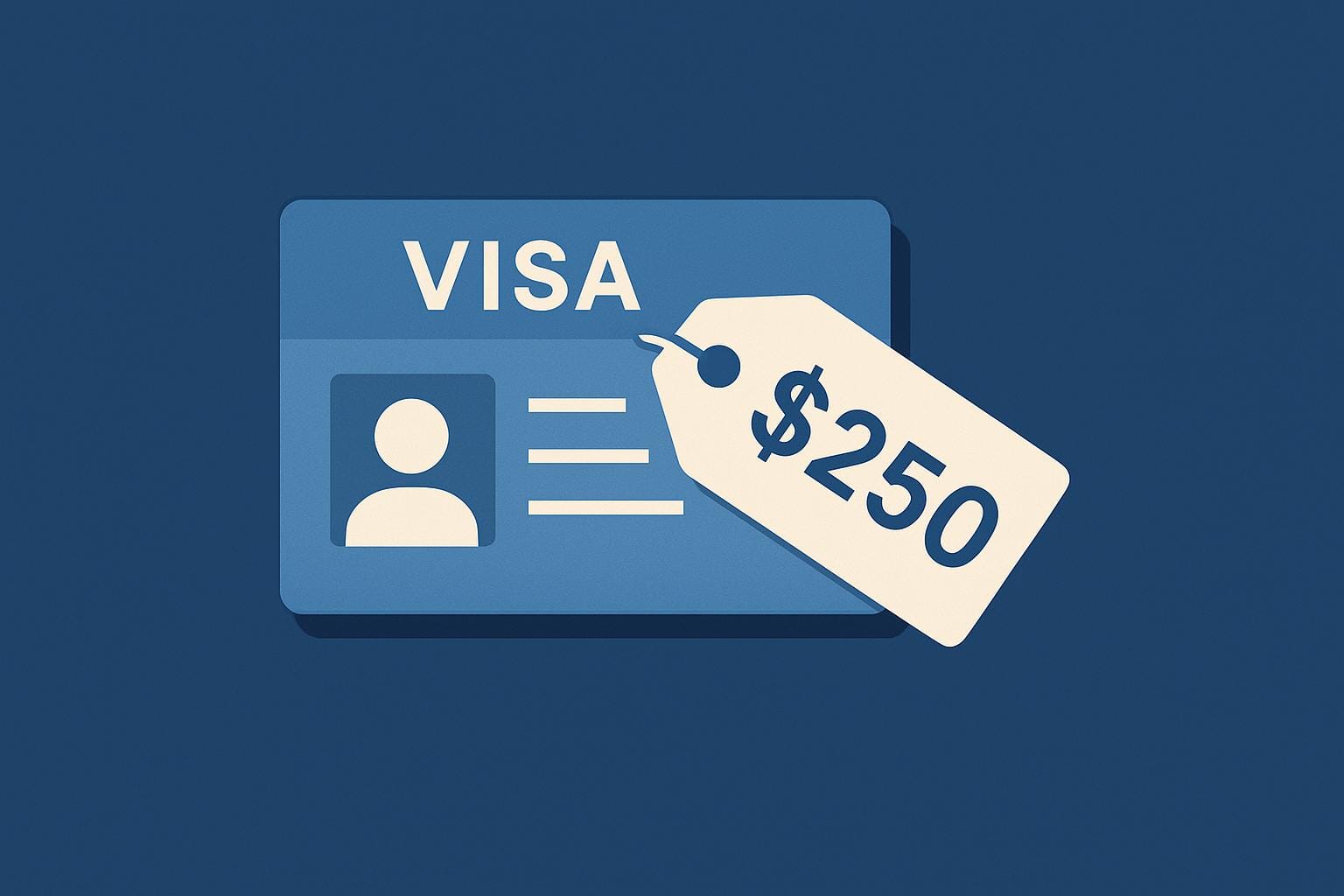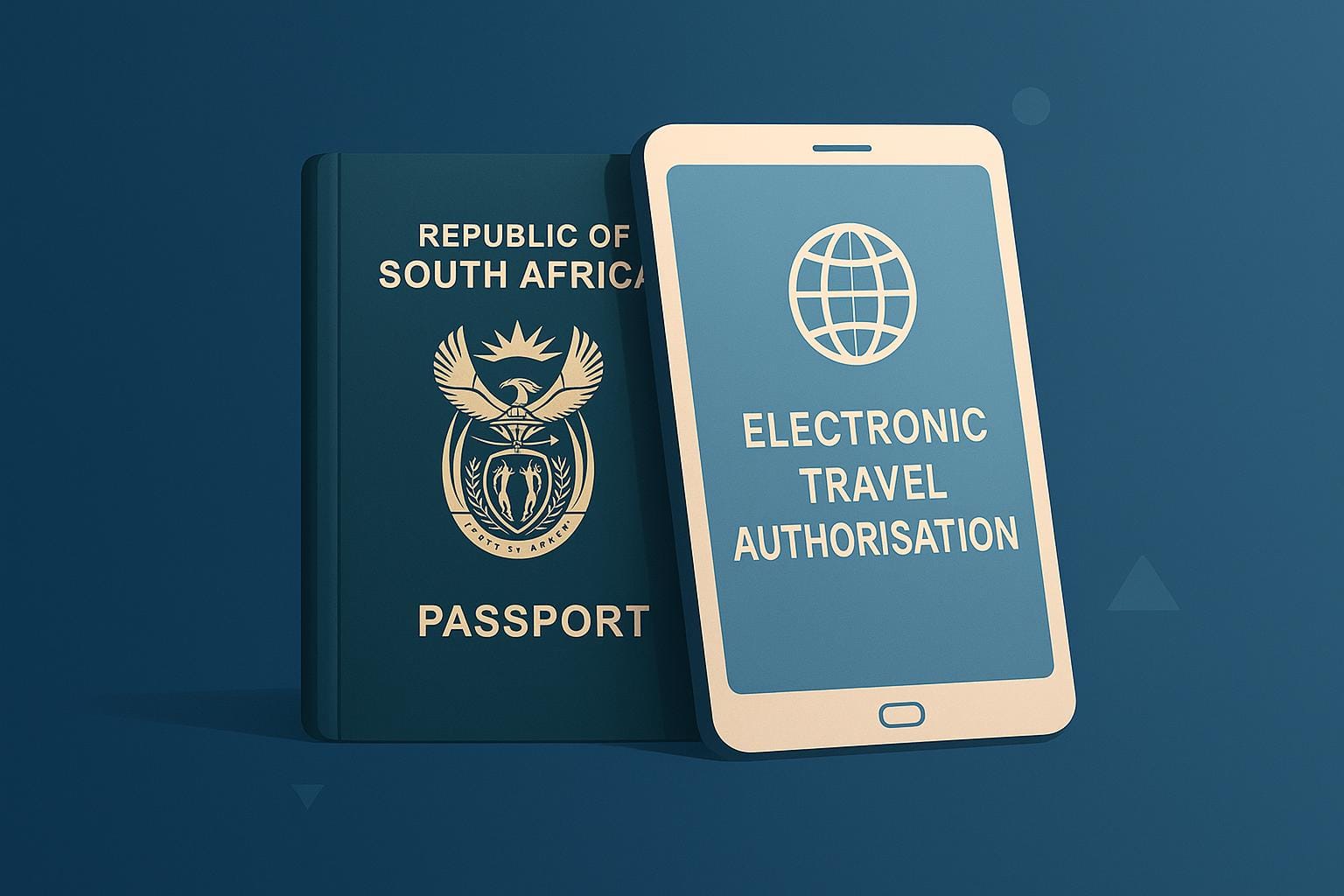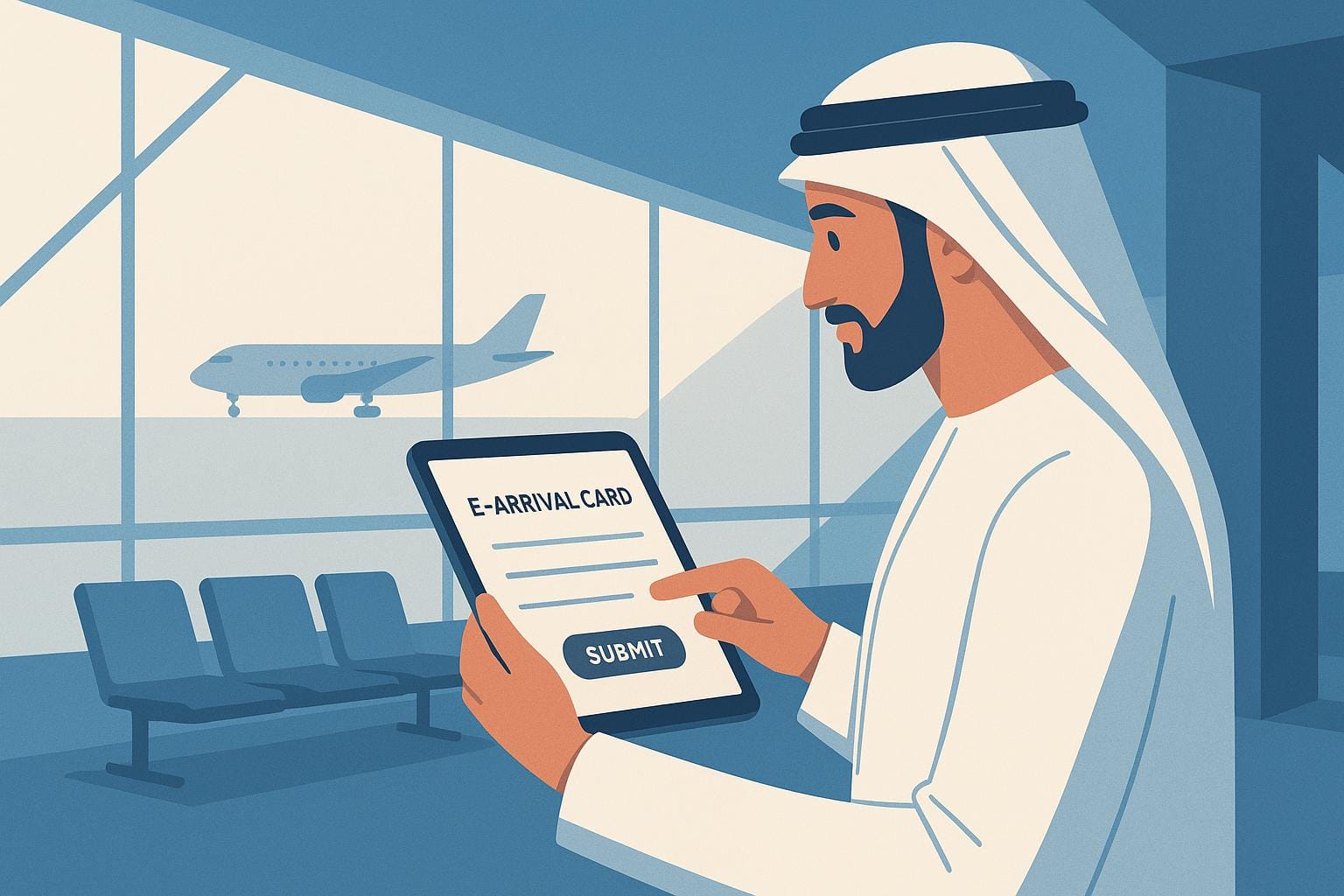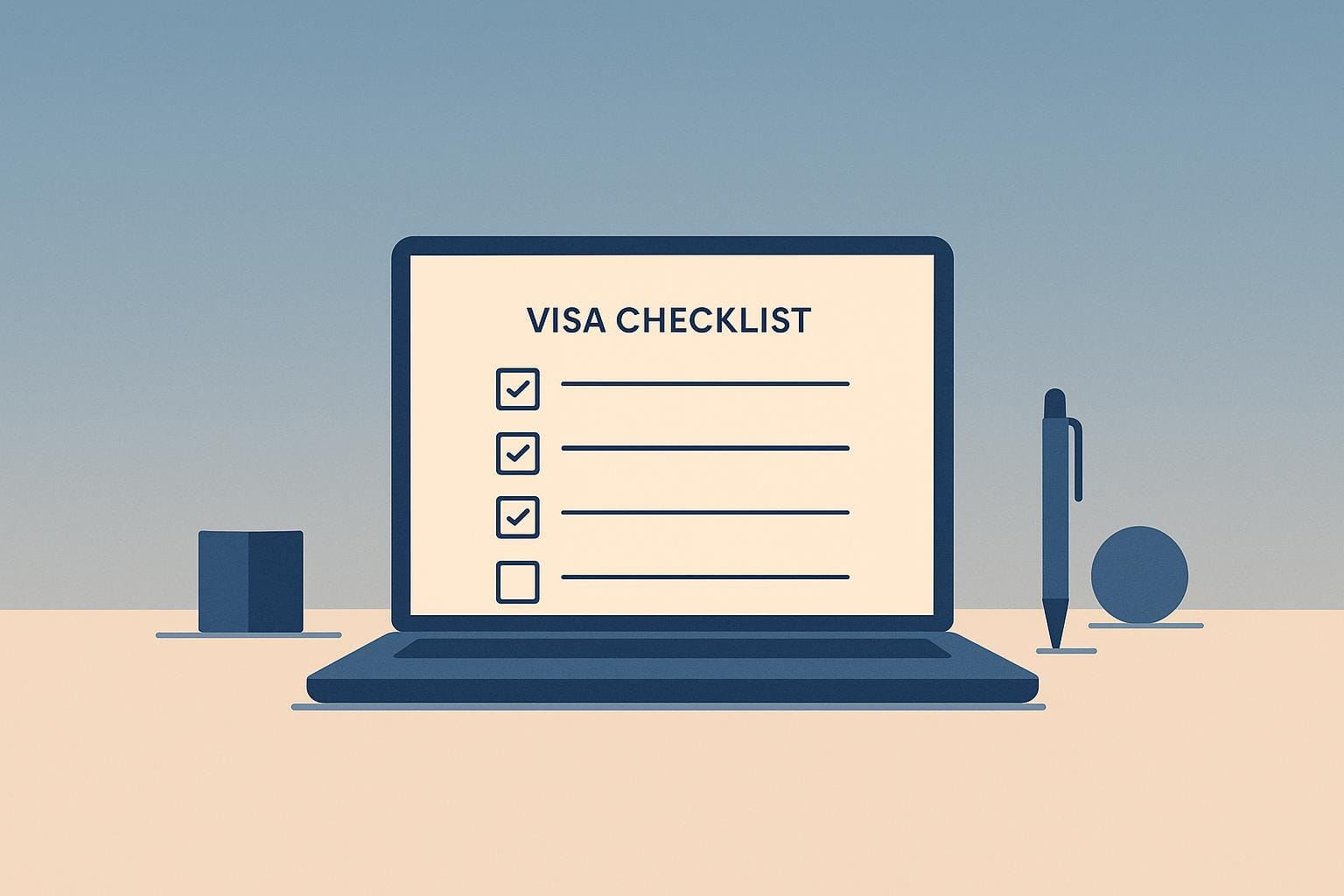Latvia is becoming a top choice for Nordic companies aiming to enter the Baltic market. Here's why:
- Strategic Location: Latvia connects the EU with Central Asia, offering fast access to Helsinki, Stockholm, and Warsaw (within 24–48 hours).
- Favourable Business Environment: Low labour costs (4th lowest in the EU), no taxes on reinvested profits, and special economic zones with tax benefits.
- Strong Nordic Ties: Sweden accounted for 29% of foreign investment in Latvia by 2022, with investments tripling between 2019 and 2023.
- Skilled Workforce: Latvia boasts a multilingual, well-educated population, simplifying cross-border operations.
- Ease of Travel: As part of the Schengen Area, Latvia allows seamless movement for Nordic executives conducting short-term business activities.
Short-Term Entry Options:
- Schengen Business Visa (C-Type): For stays up to 90 days, suitable for meetings and market research.
- Startup Visa: For launching innovative ventures, valid for up to 3 years.
- Temporary Residence Permits: For executives planning longer-term operations, valid for up to 5 years.
Nordic companies benefit from simplified banking processes and growing opportunities for partnerships in Latvia. Efficient visa management tools like VisaDoc can help streamline entry, reduce errors, and ensure compliance. Latvia’s business-friendly policies and geographic advantages make it an appealing gateway for Nordic expansion into the Baltics.
Short-Term Business Visa Options
Nordic businesses have three specific routes for establishing a short-term presence in Latvia.
Schengen Business Visa (C-Type)
The Schengen Business Visa (C-Type) serves as the primary option for many Nordic companies operating in Latvia. This visa allows stays of up to 90 days within a 180-day period, making it suitable for activities like market research, client meetings, and initial business development efforts. The application process involves an €80 fee and takes about 15 days to process. Applicants must provide an invitation from a Latvian company and proof of sufficient funds.
For more extended stays, particularly those exceeding 14 days, contractual service suppliers and independent professionals require a visa that includes employment rights. This involves additional paperwork from the inviting Latvian company. Investors, on the other hand, can apply for a short-term visa with a "BUSINESS" remark, which allows them to manage company operations without needing a separate work permit. Furthermore, the Schengen visa offers the added advantage of enabling business activities across multiple EU countries in one trip.
For startups with innovative goals, a specialised pathway is available.
Startup Visa for Entrepreneurs
Latvia’s Startup Visa is a residence permit aimed at non-EU entrepreneurs looking to launch innovative businesses. This visa is particularly appealing to Nordic companies seeking to establish subsidiaries or enter the Baltic market with new ventures.
Applicants must meet specific financial requirements, including demonstrating €4,560 for the first three months and committing to a minimum monthly income of €859. The application process takes approximately one month, with permits valid for up to three years. Up to five founders per startup can apply at the same time, providing flexibility for management teams relocating temporarily. A detailed business plan that highlights the venture’s innovative aspects is also a mandatory part of the application.
For companies requiring a longer-term presence for executives, another option is available.
Temporary Residence Permits for Executives
Temporary Residence Permits (TRP) for company executives are designed for Nordic businesses planning substantial operations in Latvia. These permits are issued for the executive’s term of office, up to a maximum of five years. To qualify, the Latvian company must have been registered for at least one year and actively contribute to Latvia’s economy. For limited liability companies, the share capital must be at least €2,800.
| Financial Requirements | Monthly Amount | Annual Amount |
|---|---|---|
| Main applicant | €2,286 | €27,432 |
| Spouse | €500 | €6,000 |
| Child | €150 | €1,800 |
Family members can apply alongside the main applicant, with spouses and children receiving permits that allow unrestricted access to the labour market. Processing fees depend on the urgency: €100 for standard 30-day processing, €200 for 10-day processing, or €400 for five-day processing. If additional information is required, the Immigration Authority may extend the decision period to 90 days.
A new rule, effective from 1 September 2025, will require foreign nationals without a Latvian visa or residence permit to notify authorities 48 hours before arrival. This rule does not apply to nationals of EEA member states.
All submitted documents must adhere to strict guidelines. Foreign documents need Apostille certification, and translations must be in Latvian, English, or Russian. Additionally, first-time applicants must provide medical certification from a Latvian doctor confirming they do not have active tuberculosis.
Compliance Requirements and Documentation
Having precise and well-prepared documentation is crucial for Nordic companies navigating visa approvals to enter Latvia. Understanding the necessary requirements helps avoid delays and ensures smooth handling of corporate mobility efforts.
Required Documents for Business Visas
For short-term business visas, you'll need to submit several key documents. First, ensure your passport is valid for at least three months beyond your intended Schengen stay and has two blank pages. Complete and sign the visa application form accurately, and include a 35 mm x 45 mm colour photograph that meets technical specifications.
You’ll also need travel medical insurance that covers the entire duration of your visit. Financial proof is mandatory, so provide attested bank statements showing sufficient funds - at least €14 per day for trips up to 30 days or €740 for longer stays. Additionally, include documents that clearly explain the purpose of your trip, such as invitation letters, conference registrations, or meeting confirmations, along with accommodation details. If your biometric data was collected by any Schengen country within the last five years, you don’t need to resubmit it.
Regulatory Requirements for Nordic Companies
Beyond visas, Nordic companies must comply with Latvian regulations to operate smoothly. Employers are responsible for maintaining valid work permits and renewing them on time. They must also adhere to payroll tax rules, ensuring accurate withholding and remittance.
Employers are required to provide safe working conditions and maintain complete employee records in Latvian or with certified translations. These records must include employment contracts and communication logs that align with Latvian labour laws. Additionally, all employment must be registered with the State Revenue Service (VID) to meet tax obligations. Using certified Latvian translators is essential, as non-certified or self-translated documents can cause delays or rejections.
Work permit fees for 2025 range from €100 to €150, with expedited processing costing more. Companies should factor these expenses into their budgets when planning expansions. Meeting these standards is key to avoiding common compliance pitfalls.
Common Visa Application Errors to Avoid
Even with proper documentation and adherence to regulations, some common mistakes can derail visa applications. Make sure all details - such as names, passport numbers, and travel dates - match exactly with official documents, as even small discrepancies can lead to rejection.
Incomplete documentation is another frequent issue. Nordic companies should use country-specific checklists to ensure no required documents are missing. Timing is equally important; most countries accept visa applications up to 90 days before travel, so starting the process early allows time for translations, document collection, and processing.
For corporate applications, accurate sponsor details are critical. Companies must ensure the sponsor section is filled out correctly and include all necessary sponsorship documents to clearly establish the business relationship.
Since embassy policies can change, it’s wise to regularly check official embassy websites for updates to avoid relying on outdated information. A pre-submission verification process can also help catch errors, ensuring details match, travel insurance is valid, and the purpose of the visit is clearly explained.
To streamline future applications, consider maintaining a centralised system. This could include a compliance matrix, templates for letters, embassy-specific checklists, and examples of successful applications. Such organisation can save time and reduce errors in future submissions.
Using VisaDoc for Visa Management
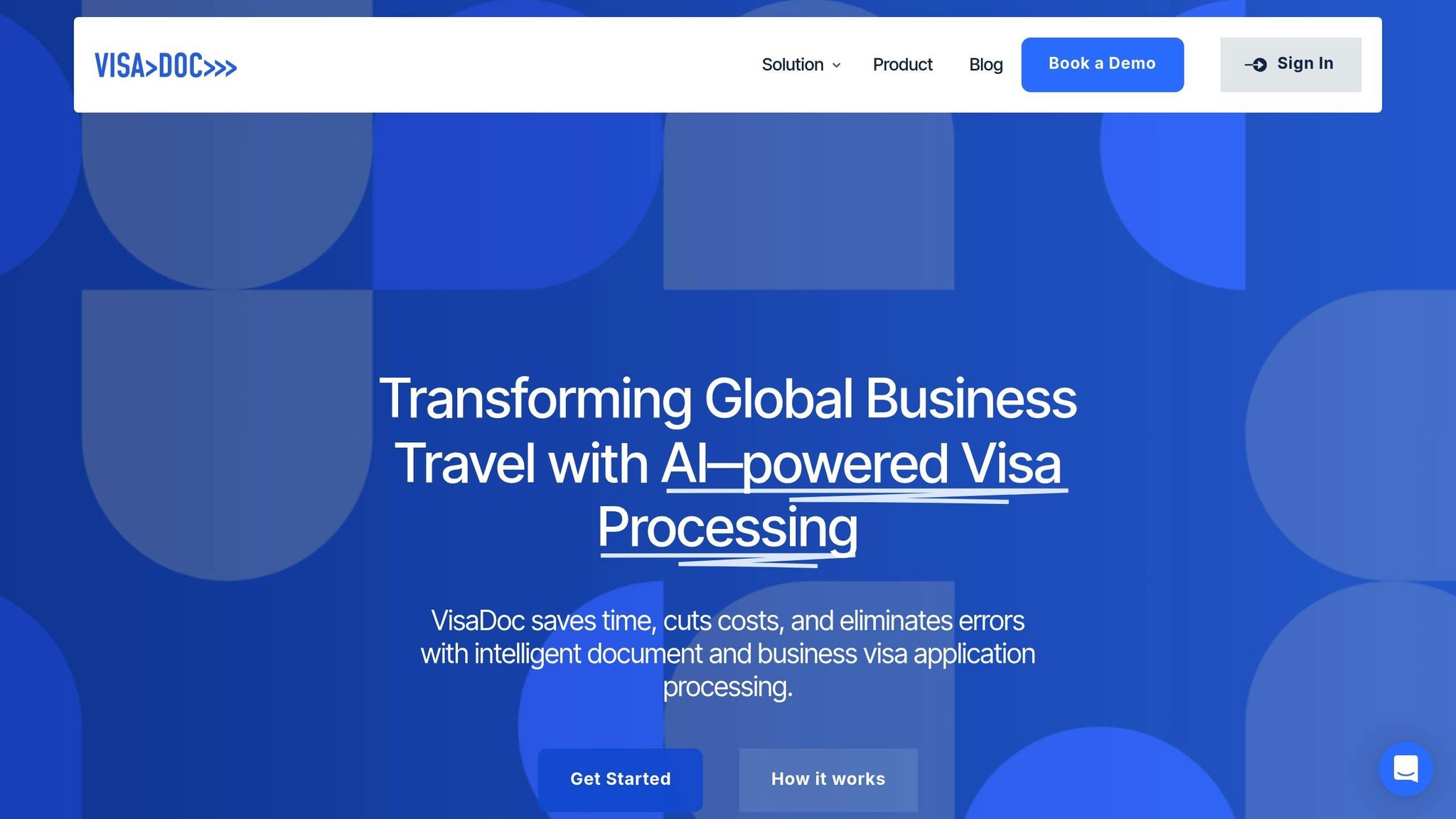
Managing visa applications for Nordic companies expanding into Latvia is much simpler with the help of automation tools like VisaDoc. Designed specifically for the needs of Nordic businesses entering the Baltic region, VisaDoc's AI-powered platform takes the complexity out of HR processes while ensuring compliance with Latvia’s evolving regulations. Here's how VisaDoc helps HR teams handle these challenges with greater ease.
VisaDoc Features for HR Teams
VisaDoc provides centralised visa guides, putting all the essential information for Latvian business visa applications in one easy-to-access place. Its automated document verification system ensures that submitted documents meet the required standards, reducing the chance of rejections.
Another standout feature is its compliance notifications, which alert HR teams to regulatory updates as they happen. This helps companies stay on top of changing rules and maintain compliance with Latvian requirements.
"VisaDoc's AI technology automates key visa processing functions, including: Visa application assistance for business travelers and corporate employees. Document verification to ensure compliance with global visa regulations. Automated error detection to reduce delays and rejections."
Additionally, VisaDoc's automated error checking catches common mistakes in applications before they are submitted, avoiding delays that often occur with manual processing.
Integration with Corporate Systems
Beyond its core features, VisaDoc integrates seamlessly with existing HR systems, making workflow management even smoother. Through its API, VisaDoc connects with HR and travel systems, offering real-time updates on visa application statuses and validity. This eliminates the need for manual data entry across platforms, freeing up HR teams to focus on other tasks.
Its real-time tracking capabilities allow HR managers to monitor the progress of applications across different embassies and consulates. For instance, if a Nordic company sends multiple executives to Latvia for market research or partnership discussions, the platform’s centralised dashboard provides a clear overview of each application’s status. This helps with planning resources and managing timelines efficiently.
VisaDoc also includes mobility tracking, which is crucial for overseeing employee movements across borders. This is especially important for meeting Latvian regulatory requirements when employees frequently undertake short-term business trips.
Benefits of Automated Visa Management
Automating visa processes brings measurable benefits for Nordic companies. With VisaDoc, approval success rates increase by 35%, and processing times are reduced by 50%. For companies entering Latvia’s competitive market, these time savings can make a big difference.
Another major advantage is the reduction in administrative workload. Currently, nearly half (49%) of organisations face errors or legal risks due to poorly managed visa application processes. VisaDoc’s automation ensures smoother workflows and provides all stakeholders with real-time updates on application statuses.
Built-in compliance checks also minimise the risk of rejections or legal issues by aligning applications with the latest regulations. On top of that, with operations staff costs accounting for up to 71% of total administrative expenses, automation becomes a cost-effective solution. By cutting down on manual tasks, Nordic companies can redirect HR resources to focus on strategic growth initiatives instead of routine paperwork.
In short, VisaDoc’s automated solutions allow Nordic businesses to prioritise their expansion efforts while leaving the complexities of visa management in capable hands.
Visa Management Best Practices
Efficient visa management is essential for Nordic companies expanding into Latvia. A well-structured process, combined with the right tools, helps ensure compliance while cutting down on administrative work. By focusing on clear workflows and choosing between manual or automated methods, businesses can handle visa applications quickly and accurately.
Step-by-Step Visa Application Workflow
A systematic approach to visa applications not only supports expansion strategies but also helps avoid common mistakes. Starting the process early gives enough time for preparing documents and arranging translations.
Here’s how the workflow typically unfolds:
- Identify the correct visa type: Understand the options available, such as the short-term Schengen C visa for business visits lasting up to 90 days, long-term D visas for extended stays, or specialised permits like the EU Blue Card for highly skilled professionals.
- Prepare and translate documents: Any non-Latvian documents must be certified, translated by authorised translators, and authenticated or apostilled by the issuing country.
- Complete employer registrations and permits: Employers need to register job vacancies, submit required documentation, and justify hiring non-EU citizens. This includes obtaining both residence and work permits, as the visa grants entry while the work permit authorises employment.
- Check for accuracy: Ensure all forms are completed correctly, using block letters or type. Consistency across documents and error-free submissions are crucial.
Using detailed checklists for each visa type is a helpful practice. These lists should cover required documents, timelines, fees, and interview preparation steps.
Manual vs Automated Processing Comparison
Comparing manual and automated processes highlights the advantages of automation, especially for HR teams. Below is a quick breakdown:
| Aspect | Manual Processing | Automated Processing |
|---|---|---|
| Error Rate | Higher due to human mistakes | Lower thanks to automated checks |
| Processing Time | Slower with manual document reviews | Faster with real-time tracking |
| Compliance Monitoring | Reactive, requiring manual oversight | Proactive, with automatic updates |
| Resource Allocation | Labour-intensive | Reduced staffing needs |
| Document Management | Disorganised, spread across systems | Centralised with instant access |
| Status Tracking | Requires manual follow-ups | Real-time updates available |
Manual processes can lead to communication gaps between HR teams and employees, leaving application statuses unclear. Automated systems, on the other hand, centralise communication and ensure employees receive timely updates and clear instructions.
Maintaining Compliance and Audit Readiness
Once applications are processed, staying compliant is critical. This involves keeping up with regulatory changes and maintaining thorough records. HR teams should monitor visa expiration dates well in advance to avoid last-minute issues.
Keep employee records up to date for audit purposes. This includes tracking permit validity, renewal schedules, and maintaining logs of all communications. Tools like VisaDoc simplify this by offering centralised document storage and automatic renewal alerts.
Automated compliance systems also play a key role by monitoring immigration law updates and notifying teams of changes that may impact ongoing or future applications.
Poorly managed visa processes can lead to errors or legal risks, with nearly half (49%) of organisations reporting such challenges. To minimise risks, companies should establish clear procedures, maintain detailed audit trails, and use automated tools for compliance checks.
Regularly reviewing visa management processes ensures continued improvement. By analysing data on processing times, success rates, and common delays, HR teams can refine workflows and enhance efficiency. Transparent communication with employees also builds trust and ensures everyone stays informed about application statuses, creating a smoother experience for all involved.
Conclusion
Latvia serves as a key entry point for Nordic companies looking to grow their presence in the Baltic region. Positioned strategically between Central Europe and Scandinavia, it provides access to a market of over 6 million consumers across the Baltic states. The country also enjoys strong trade ties with important partners like Germany, Lithuania, and Estonia. Adding to its appeal, 86% of Latvia's workforce has secondary education or higher, and an impressive 96% of its population speaks at least two languages, making it an attractive destination for international businesses.
Latvia’s business-friendly environment, supported by its EU membership and participation in the Eurozone, offers the regulatory stability that Nordic enterprises need to confidently enter the market.
However, despite these advantages, administrative challenges can pose obstacles. Inefficient visa processes, for instance, disrupt business operations - impacting 17% of business trips, costing companies around £3 billion annually, and leading to over £34 million in fines due to compliance issues. Simplifying visa procedures is critical to fully leveraging Latvia's potential.
This is where VisaDoc comes into play. By offering centralised document management and real-time compliance monitoring, VisaDoc ensures smoother visa processes. For Nordic companies aiming to tap into Latvia's promising business environment, combining the country’s inherent strengths with efficient visa management creates a winning formula for growth.
Latvia presents a compelling opportunity: a skilled workforce, strong infrastructure, and a stable regulatory framework. With modern tools like automated visa management, businesses can overcome administrative hurdles and focus on achieving sustainable growth in this vibrant and strategically located market.
FAQs
Why is Latvia an ideal entry point for Nordic businesses expanding into the Baltic region?
Latvia stands out as a key entry point for Nordic companies aiming to tap into the Baltic market. Positioned strategically between Western Europe and Russia, the country offers superb connectivity to nearby regions, making it an ideal base for expansion.
What sets Latvia apart is its combination of a stable economy, a business-friendly tax system, and a cost-conscious environment. These elements make it an appealing option for businesses looking to grow efficiently.
On top of that, Latvia boasts a skilled workforce, modern infrastructure, and regulations designed to support businesses. Together, these advantages provide Nordic companies with the tools they need to enter the Baltic market quickly and effectively.
What are the benefits of the Schengen Business Visa (C-Type) for Nordic executives expanding into Latvia?
The Schengen Business Visa (C-Type) allows Nordic business professionals to engage in short-term activities in Latvia and throughout the Schengen Area for up to 90 days within a 180-day period. Whether it's attending meetings, negotiating deals, or participating in conferences, this visa provides the flexibility of single, double, or multiple entries to suit various business needs.
By offering a straightforward application process, this visa removes barriers to cross-border travel, enabling businesses to prioritise swift market entry and operational growth. It's an efficient option for companies aiming to establish or expand their footprint in the Baltic region.
What legal and compliance steps must Nordic businesses follow to expand into Latvia?
Expanding into Latvia presents a range of compliance steps for Nordic businesses. To start, companies need to register their business, set up a registered office within Latvia, deposit the necessary share capital, and file formal articles of association. Beyond these initial steps, adhering to Latvia's anti-money laundering (AML) regulations, tax obligations, and financial reporting standards is crucial.
It's also important to follow EU and Latvian trade regulations, which cover areas like product labelling and currency controls. Meeting these requirements isn't just about ticking boxes - it's vital for ensuring a smooth entry into the Latvian market and maintaining steady operations across the Baltic region.
Related Blog Posts
- Solving Common Business Visa Delays: Expert Solutions
- Business Visa Outsourcing Providers: VFS vs TLSContact vs BLS Ultimate Comparison
- Ghana's Short-Term Business Visa for West African Market Entry Assessment Teams
- Kazakhstan's Energy Sector Business Meeting Visa: Documentation for Corporate Negotiations




